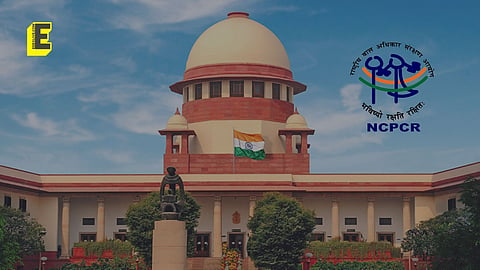

In a stunning revelation, the National Commission for Protection of Child Rights (NCPCR) has filed its written submissions in the Supreme Court and expressed its serious concerns about the kind of education imparted through Madrasas.
"In the interest of the Children, we humbly submit that the education imparted to children in Madrasa is not comprehensive, and is therefore against the provisions of Right to Education (RTE) Act, 2009," the NCPCR said in its affidavit filed before the top court, stated a report by The New Indian Express.
The NCPCR filed its affidavit in the case challenging the Allahabad High Court's (HC) decision striking down the Uttar Pradesh Board of Madarsa Education Act 2004.
In April, the Supreme Court had stayed the HC's judgment, saying that the high court prima facie misconstrued the act and that the decision would impact nearly 17 lakh students.
"The denial to extend right to education to children by these institutions with minority status not just deprives the children of their most important fundamental right to education. This exclusion/denial of these children snowballs into depriving them of their fundamental right to Equality before law (Article 14); prohibition of discrimination on grounds of religion, race, caste, sex or place of birth (Article15(1)," the NCPCR said, stated The New Indian Express report.
It further said that the act, instead of an enabling tool, becomes a depriving tool for the children studying in minority institutions.
In addition, such institutes are also providing Islamic Religious Education to Non-Muslims which is further in violation of Article 28 (3) of the Constitution of India.
NCPCR said that most of the Madrasas face several issues in ensuring quality education to the children:
1) It said that they fail to provide a holistic environment to students, including planning social events, or extracurricular activities for 'experiential learning'
(2) Children are majorly given religious teachings "with very little participation in the national mainstream education system"
(3) The teachers appointed are by the individual management of Madrasas "failing to uphold the standards laid down under the Schedule of RTE Act (Right To Education Act) stating the Norms and Standards for a school"
(4) Children are devoid of other basic amenities and environment of formal education as prescribed under various
